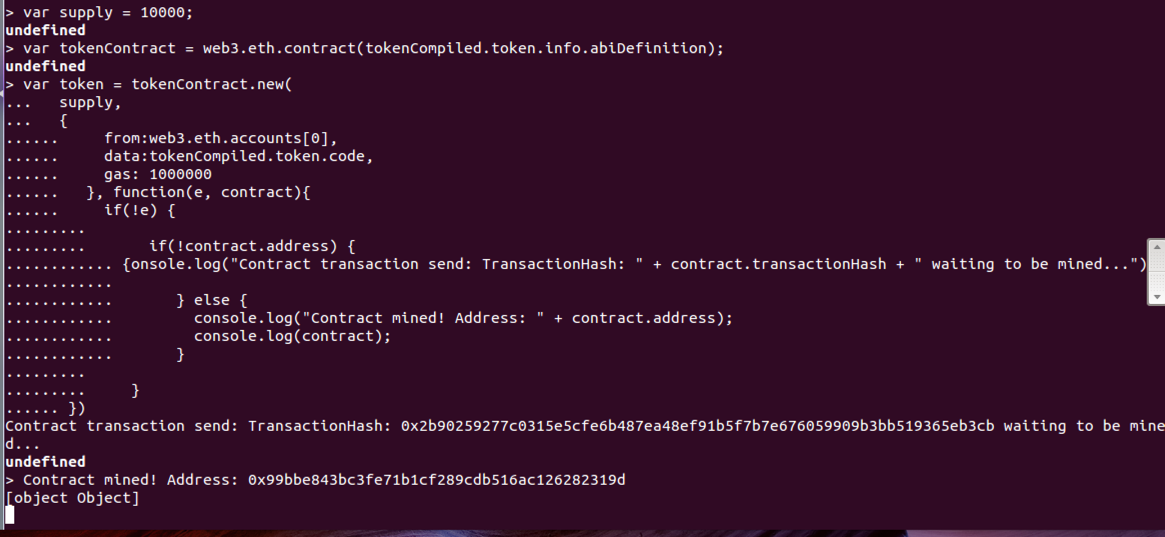
geth --mine --datadir eth-data --networkid 123 --nodiscover --maxpeers 0 console 2>>geth.log
eth.blockNumber

primary = eth.accounts[0]
personal.unlockAccount(primary)

contract token {
mapping (address => uint) public coinBalanceOf;
event CoinTransfer(address sender, address receiver, uint amount);
/* Initializes contract with initial supply tokens to the creator of the contract */
function token(uint supply) {
coinBalanceOf[msg.sender] = supply;
}
/* Very simple trade function */
function sendCoin(address receiver, uint amount) returns(bool sufficient) {
if (coinBalanceOf[msg.sender] < amount) return false;
coinBalanceOf[msg.sender] -= amount;
coinBalanceOf[receiver] += amount;
CoinTransfer(msg.sender, receiver, amount);
return true;
}
}
var tokenSource = ' contract token { mapping (address => uint) public coinBalanceOf; event CoinTransfer(address sender, address receiver, uint amount); /* Initializes contract with initial supply tokens to the creator of the contract */ function token(uint supply) { coinBalanceOf[msg.sender] = supply; } /* Very simple trade function */ function sendCoin(address receiver, uint amount) returns(bool sufficient) { if (coinBalanceOf[msg.sender] < amount) return false; coinBalanceOf[msg.sender] -= amount; coinBalanceOf[receiver] += amount; CoinTransfer(msg.sender, receiver, amount); return true; } }'

In the geth console, execute this command.
var tokenCompiled = eth.compile.solidity(tokenSource)

var supply = 10000;
var tokenContract = web3.eth.contract(tokenCompiled.token.info.abiDefinition);
var token = tokenContract.new(
supply,
{
from:web3.eth.accounts[0],
data:tokenCompiled.token.code,
gas: 1000000
}, function(e, contract){
if(!e) {
if(!contract.address) {
console.log("Contract transaction send: TransactionHash: " + contract.transactionHash + " waiting to be mined...");
} else {
console.log("Contract mined! Address: " + contract.address);
console.log(contract);
}
}
})

token.coinBalanceOf(eth.accounts[0]) + " tokens"

In the geth console, execute this command.
var event = token.CoinTransfer({}, '', function(error, result){
if (!error)
console.log("Coin transfer: " + result.args.amount + " tokens were sent. Balances now are as following: \n Sender:\t" + result.args.sender + " \t" + token.coinBalanceOf.call(result.args.sender) + " tokens \n Receiver:\t" + result.args.receiver + " \t" + token.coinBalanceOf.call(result.args.receiver) + " tokens" )
});

personal.newAccount()

personal.listAccounts

In the geth console, execute this command.
token.coinBalanceOf(eth.accounts[0]) + " tokens"
